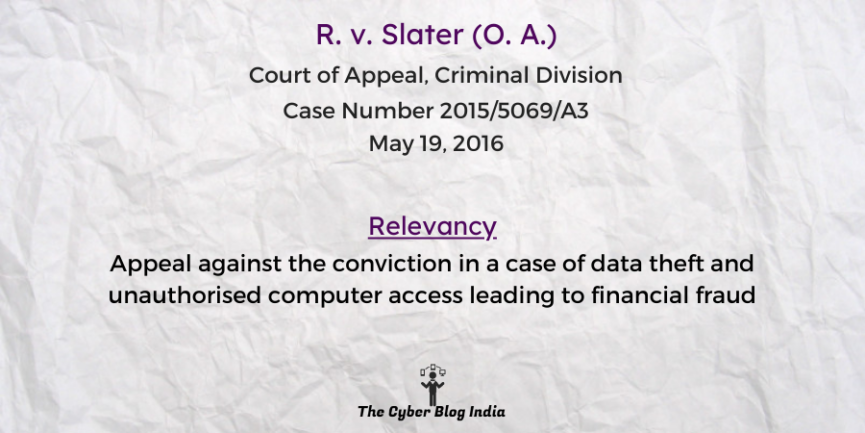R. v. Slater (O. A.)

R. v. Slater (O. A.)
[2016] EWCA Crim 935
In the Court of Appeal, Criminal Division
Case Number 2015/5069/A3
Before Lord Justice Hamblen, Justice Globe and Judge Wait
Decided on May 19, 2016
Relevancy of the case: Appeal against the conviction in a case of data theft and unauthorised computer access leading to financial fraud
Statutes and Provisions Involved
- The Computer Misuse Act 1990 (Section 2(1))
Relevant Facts of the Case
- Slater, a derivatives trainer, left his employer, Prime Markets Limited, to form GSC with Anthony Greenway. Before leaving, he downloaded Prime Markets Limited’s database without authorisation.
- He and his team used the stolen database to cold call potential investors, persuading them to invest in worthless rare metals. The scheme defrauded investors out of over £208,000.
- Multiple victims suffered significant financial and personal losses due to the fraud. This led to stress, health issues, and a loss of trust in financial institutions.
Prominent Arguments by the Counsels
- The appellant’s counsel argued that:
- The starting point for the sentence was too high based on the Sentencing Council Fraud Guidelines. Moreover, there was a gross disparity between his sentence and that of his co-conspirator.
- The consecutive sentence for unauthorised access to the computer database was unjustified, and insufficient allowance was made for his mitigation.
- The Crown did not appear and was not represented during the appeal.
Opinion of the Bench
- High culpability and significant harm caused justified the sentence within the Sentencing Council Fraud Guidelines range, making the starting point appropriate.
- The disparity between the defendant’s and Greenway’s was justified based on differing levels of culpability and harm.
- The trial judge’s findings were well-founded. Therefore, the appellant’s sentence was not manifestly excessive.
Final Decision
- The court dismissed the appeal, affirming that the original sentence of four years and four months imprisonment was justified.
